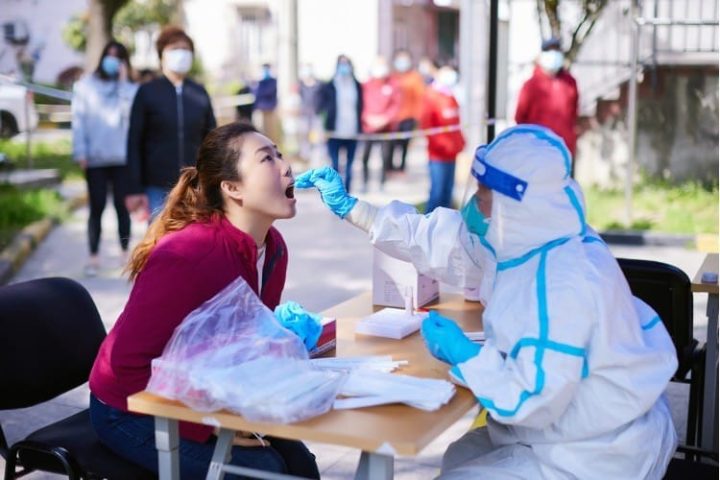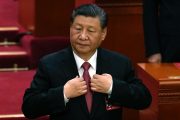
Netizens in China are urging authorities to prohibit the public listing of companies that offer Covid-19 tests, accusing such companies of profiting at the expense of the well-being of the public.
Such calls for government action come amid rising public anger with the communist state’s mass-testing strategy on the pretext of curtailing Covid-19 outbreaks.
Netizens suggested that the government enact laws to order companies that have made money from China’s zero-Covid-19 policy to hand over a portion of their profits to the government.
Public scrutiny of the “Covid-19 economy” has increased following local media reports in November that the government approved the initial public offering (IPO) plans of at least five companies that offer nucleic testing services.
Microblogging platform Weibo featured a hashtag detailing the official IPO approval on November 29, and has since attracted 140 million views and prompted 8,000 discussion threads.
Weibo user Keluoliaofu, who has 6.44 million followers and typically writes about China’s military matters, wrote on Thursday: “Allowing companies that grow rich because of nucleic testing to go for an initial public offering is to endorse feeding off the people’s pain from the pandemic and sucking society’s blood.”
Financial blogger Quanquan1020, who has 970,000 followers on Weibo, echoed a similar sentiment: “Any industry that seeks to hollow out society is doomed to fail.”
Draconian measures on the pretext of curtailing Covid-19 outbreaks have been met with rising public resentment, with rare protests erupting nationwide recently to fight against lockdowns in neighborhoods where residents are infected or are close contacts of positive cases.
Covid-19 tests have been a major source of irritation among the Chinese public, who have become fatigued from the harsh measures since the virus outbreak in 2020. They occasionally have to endure prolonged waits to take a nucleic acid test at least once every other day to use public transport and enter public spaces, including offices, restaurants, and grocery stores.
The public outcry to prohibit companies that offer tests from listing follows a furor in August when listed biotechnology firms that provided the tests reported sky-high earnings for the first half of 2022.
For instance, Wuhan Easy Diagnosis made 2.76 billion yuan (US$533 million) between January and June, more than three times the figure from a year ago. Daan Gene’s profit increased 132 percent to 4.31 billion yuan during the same time frame.
Beijing resident Xiao Mingxu, 35, lambasted: “It’s really ridiculous how these companies have been making so much money from the pandemic, while the ordinary people have been struggling to survive, with all the lockdowns and poor economic sentiment.”
Xiao, a computer programmer at a technology company, lamented that his pay is halved whenever he has to work from home. He has experienced four lockdowns this year, each ranging between one and two weeks.
Some firms providing Covid-19 tests have also been embroiled in scandals.
The National Health Commission announced on Tuesday that it will be increasing supervision of testing firms and will heavily punish illegal activities such as offering false results, after reports of fraudulent cases in various cities such as Hefei in eastern China and Beijing and Shijiazhuang in the north.
Police in Shijiazhuang are investigating a firm for claiming that it was able to amend the positive test result of someone infected with Covid-19 to negative, based on a social media leak on Douyin (Chinese TikTok).
The leak also divulged that a 3,500 yuan bonus was given every time a person is taken to one of China’s makeshift quarantine centers, famous for their mediocre facilities that residents have been trying to avoid.
In May, three testing facilities in Beijing — Zhongtong Lambo Medical Testing Laboratory, Jinzhun Medical Testing Laboratory, and Pushi Medical Laboratory — were charged with fraud. More than 30 suspects were questioned. The companies had tried to reduce costs and time by combining more than the permitted number of samples in one test, despite such actions leading to false results.
China tests residents in batches of up to 10 people to reduce costs, mostly paid for by the local governments.
One of the companies had also over-declared the number of tests it conducted to profit from the government.
Public discontent has led Shanghai and Shenzhen stock exchanges to declare on November 21 that the authorities will continue to strictly evaluate testing firms’ applications to go public.
Both exchanges announced that they will “inspect whether the firms still qualify for an IPO after excluding their nucleic acid testing business and taking into account the sustainability of their revenue.”
At least one company — Yeasen Biotechnology — had its IPO rejected. On Nov 23, the Shanghai Stock Exchange said that it was because “more verification is needed” for the supplier of testing materials.
Up to 40 percent of Yeasen’s revenue was due to China’s zero-Covid-19 policy, according to media reports.
However, netizens felt existing actions were inadequate, stating that the companies should not be allowed to list at all, on moral grounds.
The financial blogger Quanquan1020 said that the profits for these firms are also fast dwindling owing to dropping batch-testing prices. To protect investors, these firms should not be listed.
Meanwhile, China is slated to further loosen up strict Covid-19 measures, according to a Reuters news report. China’s strict approach has adversely affected its economy — the world’s second-largest — increasing the mental, physical, and economic woes of hundreds of millions of people. Recently, regional authorities have eased lockdowns, testing requirements, and quarantine rules. Top officials have also portrayed the virus in less-threatening ways to the public.



